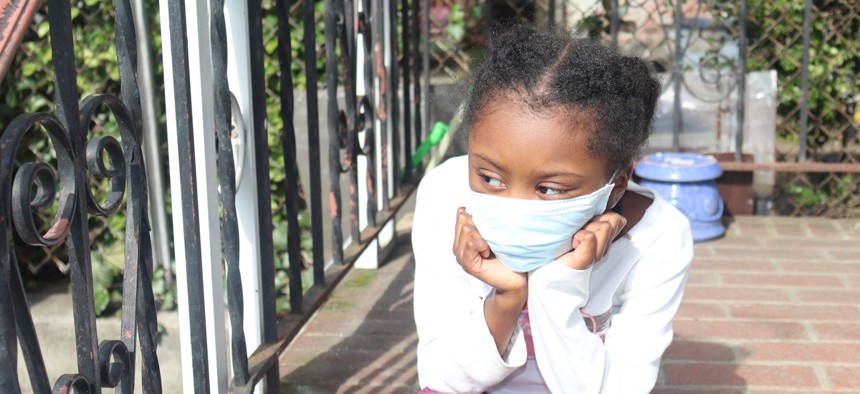Nearly 100,000 Children Test Positive for Coronavirus in Two Weeks

Almost 100,000 chldren tested positive for coronavirus in the last two weeks of July. Shutterstock
The new numbers come as back-to-school season begins in some places.
More than 97,000 children tested positive for the coronavirus in the last two weeks of July, a 40% increase in the number of children who have been reported to have the virus.
The findings are from a new report from the American Academy of Pediatrics, which comes as some school districts across the country welcome back thousands of children for in-person learning, worrying public health officials who say that school reopenings could lead to a spike in coronavirus cases among students, staff, and families.
The American Academy of Pediatrics analyzed state-level data about coronavirus cases by age and found that of the almost five million reported cases in the country, 338,982 of them are now associated with children.
Every state except New York reported some age-related data with their cases, although Texas reported age-related data for only 8% of cases. Most states defined children as people under the age of 19, though two states, Utah and Florida, capped the upper limit at age 14. One state, Alabama, counted children up to age 24.
Six states each reported more than 15,000 child cases. Several of these states, like Florida and Arizona, have become hotspots for the virus in the past month.
Overall, children now make up 8.8% of cases nationwide. In the four states with the highest percentage of their cases attributable to children—Wyoming, Tennessee, New Mexico, and South Carolina—they comprise 15% or more of all cases.
Despite the rising number of children who are testing positive for the virus, deaths are relatively rare, with 86 child deaths since May. Twenty states reported no child deaths at all, and in all states reporting age in mortality numbers, children made up less than 1% of deaths. Most children who contract coronavirus are asymptomatic.
Last week, a 7-year-old Black child who had no preexisting health conditions died of the virus in Georgia, becoming the state’s youngest victim.
"Every Covid-19 death we report is tragic, but to lose someone so young is especially heart-breaking," said Dr. Lawton Davis, the director of the state’s coastal health district, in a statement following the boy’s death. "We know that older individuals and those with underlying conditions are at higher risk of complications, but this is a disease everyone should take seriously.”
The new study comes as communities weigh whether to attempt in-person education at schools this month, often considering the negative experiences many students had with remote learning at the end of the last school year, where many lacked online access or simply struggled with the format.
But school leaders are also making these decisions while looking at very different levels of community spread of Covid-19. For example, Dr. Anthony Fauci, director of the National Institute for Allergy and Infectious Diseases, has said it can be appropriate to open schools, but leaders need to take into account a local area’s infection rates. "There may be some areas where the level of virus is so high that it would not be prudent to bring the children back to school," he said. ”So you can’t make one statement about bringing children back to school in this country, it depends on where you are.”
Last week, photos from one Georgia school attracted national attention for showing a high school hallway where social distancing was impossible between throngs of maskless students. The school is temporarily reverting to virtual schooling after six students and three teachers tested positive for the virus. Georgia continues to have one of the highest per capita Covid-19 case rates in the country.
Scientists studying the coronavirus believe that young children are less likely to transmit the virus than adults, but one study found that older children between the ages of 10 and 19 spread it just as much as adults do. The full impact of the virus on children is still largely unknown; research into Covid-19’s long-term effects on children who contract it is still ongoing, led in the U.S. by the Centers for Disease Control and Prevention and Boston Children’s Hospital.
In light of recent reports about children getting and transmitting the disease, public health experts say that officials should be wary about school reopening plans. On Good Morning America this week, Dr. Ashish Jha of the Harvard Global Health Institute said that “kids transmit less; not zero, but less.”
"Those numbers are a reminder that children are not immune from this disease," he said.
The nation's largest school district in New York City plans to partially return to in-person schooling this fall. The city has 6,608 confirmed child cases and 13 child deaths. New York currently has one of the lowest coronavirus rates, but was an epicenter for the disease earlier in the pandemic.
Mayor Bill de Blasio said Friday that school and city officials "have worked incessantly to get this right."
"They've looked at examples from all over the world of what will keep the school community safe, and they've made a series of choices of how to do things from the health and safety lens first, while also making sure we can educate our kids," he said.
Emma Coleman is the assistant editor for Route Fifty.
NEXT STORY: 7 questions to ask before implementing new technology






